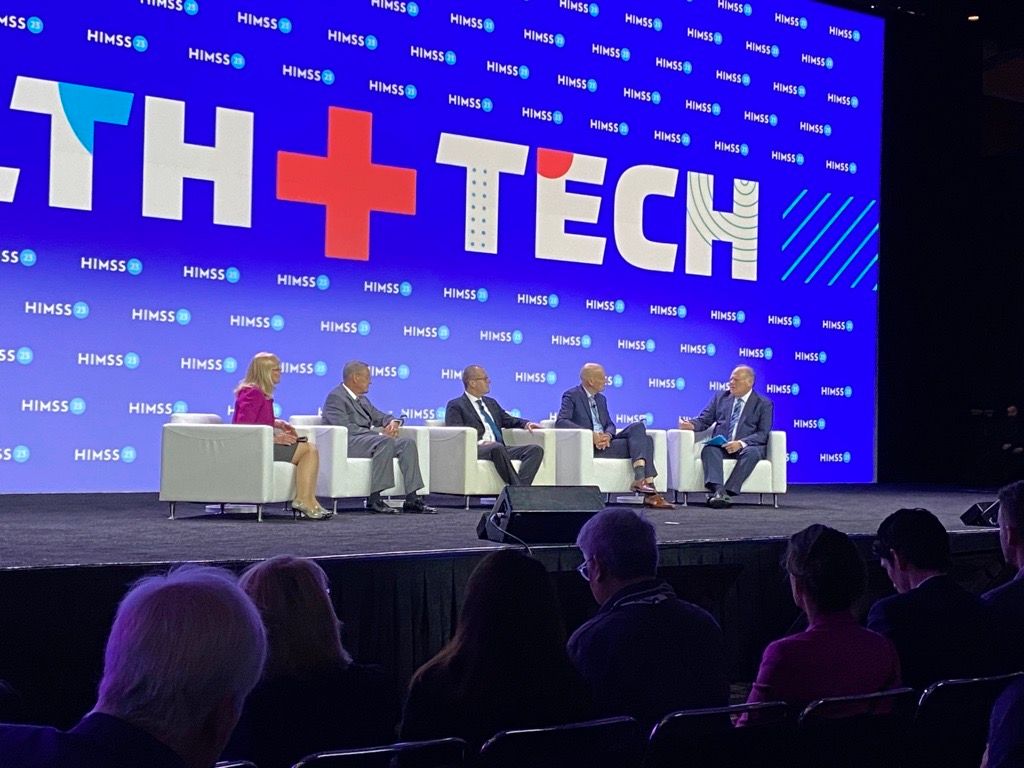Health tech companies urged to design products with equity in mind
At the HIMSS Conference, healthcare leaders urged those developing digital solutions to make sure they aren’t just accessible to the affluent. And they stressed that health equity is everyone’s responsibility.
Chicago - The annual HIMSS Conference may be focused on health technology, but many of the panels and discussions highlighted the need to improve care in underserved communities around the world.
Technology companies heard one message repeatedly at the conference: design products and solutions with health equity in mind.
Health technology leaders at the HIMSS Conference were urged to design digital products with health equity in mind. (Photo: Ron Southwick)

Lester Martinez-Lopez, the U.S. assistant secretary of defense for health affairs, said companies and entrepreneurs need to ensure that their tools and products can help underserved groups, including those in rural areas.
“If you have a very fancy solution that only addresses fancy people in cities, you have to go back to the drawing table,” Martinez-Lopez said, drawing applause from the audience of a panel discussion at the conference. “That’s something I’m very concerned about.”
During a panel discussion on health equity from a global perspective, Hans Kluge, the World Health Organization’s regional director for Europe, said the healthcare industry needs “equity-by-design tools.”
“Every one of us has a role to decrease inequities,” Kluge said.
Ernst Kuipers, minister of health, welfare and sport in The Netherlands, says there must be a greater focus on nutrition and prevention of illnesses worldwide.
Kluge also called for more work across the healthcare ecosystem to address the social determinants of health.
“We need to put health and equity at the heart of all policies,” Kluge said.
With that focus, Kluge said health isn’t simply “a beneficiary of economic development but a driver."
Health leaders discuss improving health equity during the HIMSS Conference. (Photo: Ron Southwick)

Kluge also stressed the need for good data reflecting a diverse mix of groups, or digital tools will be inequitable. He said it’s critical to start amassing better data.
“We have to start from the very beginning,” Kluge said.
To get more people to share their health data, Martinez-Lopez says the health industry must build trust with the public, including people who have well-founded mistrust of the medical establishment.
- Read more: Making health equity sustainable
Päivi Sillanaukee, ambassador for health and wellbeing for Finland’s ministry for foreign affairs, said the public needs to be assured their private health information is going to be protected. “Data privacy is so important,” she said.
But she said it’s critical to get more data for researchers to form cohorts, and to move toward more personalized healthcare.
Kay Firth-Butterfield, chief executive officer of the Centre for Trustworthy Technology, sees the potential for artificial intelligence to exacerbate disparities in healthcare. She noted 3 billion people worldwide don’t have access to internet services. She said that’s why she joined other healthcare leaders in signing a letter calling for a six-month pause on development of AI systems more powerful than ChatGPT-4.
“How do we design a future allowing everyone to access these tools? That’s why I signed the letter,” Firth-Butterfield said.
Hal Wolf, the president and CEO of HIMSS, said at a media briefing that more leaders are devising plans to improve health equity, and he expects more meaningful progress as health leaders aren’t as consumed with the COVID-19 pandemic.
“The strategies that are being put into place are absolutely concrete,” Wolf said. “I think it's going to take a couple of years to get the full measure out of it.”
But Wolf said improving the digital health infrastructure is essential to offering better opportunities for healthcare around the world. He said there is an “invaluable link between the development of digital health infrastructure and its ability to reach people from an access and quality standpoint.”
“Suddenly, someone who's sitting in a rural ecosystem now has access to a specialist they didn't have,” Wolf said.
Read more: Hal Wolf, HIMSS CEO, talks about digital health and health equity
Healthcare leaders: Prepare for a very different HIPAA security rule | Viewpoint
April 20th 2025The proposed changes to the HIPAA Security Rule are significant. Executives and boards need to prepare as the days of voluntary compliance end and a new era where leaders are held personally accountable emerges.
Telehealth faces a looming deadline in Washington | Healthy Bottom Line podcast
February 12th 2025Once again, the clock is ticking on waivers for telemedicine and hospital-at-home programs. Kyle Zebley of the American Telemedicine Association talks about the push on Congress and the White House.